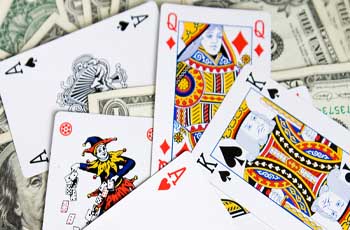
Most of us have visited a casino or played the lottery. In fact, about 85 percent of U.S. adults have gambled at least once during their lives. But when does occasionally rolling the dice or buying a scratch-off become problem gambling?
Problem gambling is defined as any gambling behavior that disrupts your life. Gambling addiction (or pathological gambling) is distinguished by the inability to control the impulse to gamble, even if the ramifications are dire for you and your loved ones. Suffering from gambling addiction or problem gambling is also often linked with other behavior health issues, including depression, anxiety, substance abuse, uncontrolled ADHD or stress, and bipolar disorder.
Are You at Risk for Problem Gambling?
If you answer “yes” to any of these questions, you are at risk of developing a gambling problem.
During the past 12 months:
- Have you become restless, irritable or anxious when trying to stop or cut down on gambling?
- Have you tried to keep your loved ones from knowing how much you gambled?
- Did gambling losses cause you to get help with your living expenses from family, friends or welfare?
While having a gambling problem is difficult to admit, that’s often the first step toward recovery. Remember, people from all backgrounds and walks of life face this issue. It’s estimated that 2 million U.S. adults have a gambling addiction and another 4 to 6 million meet the criteria for problem gambling. With increased access to online gaming, casinos and lottery outlets, anybody can develop a problem if they aren’t aware of the risks and don’t gamble responsibly.
Help for Problem Gambling
If you’re struggling with the effects of problem gambling—whether they’re financial, personal or both—don’t go it alone. You can rebuild your life by embracing these strategies:
- Seeking help from a professional. This could mean getting professional counseling for your gambling problem, along with any underlying mood disorders (e.g., stress, depression, substance abuse).
- Learning how to relieve stress, anxiety, loneliness or other unpleasant feelings through healthier approaches, such as exercising, practicing mediation or other relaxation techniques, taking up a new hobby, or spending time with people who don’t gamble.
- Having a strong social network. If yours is limited, strive to make new friends or meet new people (outside of online gambling or casinos). Volunteer, reach out to coworkers, join a club or recreational group, or take a class.
- Joining a peer support group like Gambler’s Anonymous for ongoing advice, guidance and understanding.
- Making a permanent plan to steer clear of gambling. Surrounding yourself with positivity and people who hold you accountable, avoiding tempting environments, and finding healthier alternatives to gambling can keep you on the path to lasting peace and wellness.
For additional hope and help, visit the National Council on Problem Gambling or Gamble Responsibly. Holland Hospital also staffs experienced, compassionate specialists who deliver confidential care for a wide range of behavioral health concerns, including problem gambling.